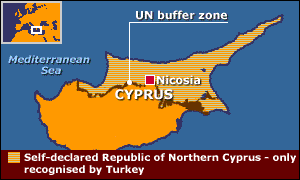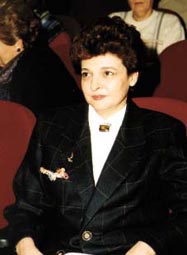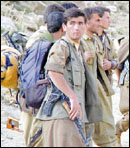29
January 2002
![]()
1. "Police detain 29 people demanding Kurdish lessons", Istanbul police detained 29 people the majority of them being women attempting to submit petitions asking for Kurdish lessons in schools, the Anatolia news agency reported on Monday.
2. "No talks with Turkey soon, minister says", Cyprus issue a hurdle.
3. "Piskinsut's TDP becomes the 44th party of Turkey", New party formed by former Parliamentary Human Rights Commission chairman and former DSP deputy Piskinsut has three members in 550-seat Parliament.
4. "What Turkey should change is her mentality", opinion By Dr. Cuneyt Ulsever.
5. "The EU and the PKK", the recent moves launched by the PKK to gain at the table what it lost at the front.
6. "Turkey: Governor says violence in Southeast almost 20 per cent down in 2001", Emergency Rule (OHAL) Governor Gokhan Aydiner has said that a total of 199 terrorist incidents in 11 provinces took place in 2001 and they caught 410 terrorists during these incidents.
1. - AP - "Police detain 29 people demanding Kurdish
lessons": 
Istanbul police detained 29 people the majority of them being women
attempting to submit petitions asking for Kurdish lessons in schools,
the Anatolia news agency reported on Monday.
For the last two weeks dozens have been detained and some arrested as a part of a dispute for Kurdish education.
Prime Minister Bulent Ecevit, earlier said his government will not yield to such demands which he said threatens the country's unity.
The government alleges that the outlawed Kurdistan Workers Party (PKK) is pressuring activists to assert their Kurdish identity as Turkey is pressured by the European Union (EU) to grant broader cultural rights to Kurds.
In a move to strengthen its EU bid, Turkey has recently
allowed Kurdish broadcasting but it fears that allowing education in
Kurdish would divide the country along ethnic lines. ![]()
2. - Kathimerini - "No talks with Turkey soon, minister says":
Cyprus issue a hurdle 
There can be no long-lasting improvement in Greek-Turkish relations
while the Cyprus issue is still unresolved and the Turks keep raising
issues over the Aegean Sea, Defense Minister Yiannos Papantoniou told
Kathimerini in an interview published yesterday.
Papantoniou believes this year and the next will be crucial for the resolution of several of these conflicts, but warns that Turkey seeks to raise tensions.
"Experience has shown that when Turkey faces pressure or believes that various disputes it has with Greece are entering a crucial phase, it creates artificial tensions," said Papantoniou, citing increased incursions of Turkish fighter planes into Greek air space, hawkish statements by Turkish premier Bulent Ecevit and renewed claims involving the countries' joint participation in NATO exercises.
Despite these statements, Papantoniou believes that Greece's more conciliatory policy toward Turkey, initiated in 1999 and championed by both Prime Minister Costas Simitis and Foreign Minister George Papandreou, was correct.
"I've always believed that it was wrong for us to say, 'We won't talk with the Turks.' The (current) policy has achieved a great success: it has improved relations between Greece and Turkey," said Papantoniou.
Turkey indicated yesterday that it would be ready to resolve its disputes with Greece at the International Court of Justice, as Greece has insisted it should.
"There can be developments in the Aegean," Turkish Foreign Minister Ismail Cem said yesterday in an interview to TV channel CNN-Turk. "Be it dialogue, mediation, arbitration or even the international court, we're open to all."
Turkey has previously insisted on dialogue between the
countries. Greece, which recognizes only one legitimate dispute with
Turkey in the Aegean - the delimitation of the continental shelf - rejects
any dialogue on Turkey's territorial claims, refusing to legitimize
them. ![]()
3. - Turkish Daily News - "Piskinsut's TDP becomes
the 44th party of Turkey":
New party formed by former Parliamentary Human Rights Commission chairman
and former DSP deputy Piskinsut has three members in 550-seat Parliament

Former Parliamentary Human Rights Commission Chairperson Sema Piskinsut's
new political party, the Communal Democrat Party (TDP), became official
on Monday.
TDP is Turkey's 44th political party and has three members in the 550-seat Parliament.
Apart from its leader Piskinsut, former DSP deputies Nezire Karakus and Mehmet Ozcan are the founding members of the new party.
In the light of this new development, the number of independent lawmakers in Parliament has decreased to 14.
The main coalition partner, the Democratic Left Party (DSP), has 129 seats, while its partners, the Nationalist Movement Party (MHP) has 127 and the Motherland Party (ANAP) has 79 members.
The main opposition True Path Party (DYP), led by Tansu Ciller, has 85 lawmakers in Parliament.
The two parties that formed from the ashes of the now defunct Virtue Party (FP) after its closure by the Constitutional Court, the Justice and Development Party (AKP) has 53 seats and the Saadet (happiness or contentment) Party (SP) has 48 members.
Piskinsut's TDP becomes the seventh party with seats in Parliament.
Piskinsut resigned from the DSP last year and accused her chairman, Prime Minister Bulent Ecevit, of mismanaging the economy and "sentencing the people to unemployment and poverty."
Piskinsut is one of the few women in Turkey's Parliament, and is a respected human rights advocate.
Before her resignation, she unsuccessfully challenged Ecevit for the leadership at a party congress, but was booed by delegates and not allowed to address the meeting.
Ecevit, 76, has led the DSP, for more than a decade, and tolerates little dissent within the party.
Piskinsut pledges collective administration in her party
Piskinsut in her first press conference as leader of the newly-founded TDP said that there will be no leader dictatorship in her party.
"The TDP will be a party administrated by a collective mind," Piskinsut pledged.
Piskinsut added that her party symbolized the new "hope" of Turkey, which is going through a very difficult period.
Turkey has been suffering the effects of the biggest economic crisis of its history, and public opinion polls reveal that the majority of Turkish people do not believe that the current three-way coalition is capable of curing the crisis.
Recent public opinion polls also show that the majority of the Turkish electorate are seeking new parties.
In this light, the Turkish political scene has been witnessing
new formations, both in center-left and center-right, since last year.
![]()
4. - Turkish Daily News - "What Turkey should change is her mentality":
Opinion By Dr. Cuneyt Ulsever 
Turkey is really doing her best to change. She can not resist change
for two major reasons:
1) The pressure in favor of change from the outside world is at the maximum. The Western European countries and the United States are well aware that Turkey is a definitely needed ally with her economic capacity, geographical location, the unique culture which flavors Islam with democracy even if the latter is not fully enjoyed.
Turkey may really play the role of a bridge between Islamic and Western cultures.
Her potential meaning for the world has definitely increased after the Sept. 11 terrorist attacks.
2) The demand for change, after three-and-a-half coups in her recent history, has also reached a maximum level among her citizens as well. The dominant centralist system that puts the state in the center of all concerns have "beaten" at least once all different cultural, ideological and ethnical elements in the country in the last 40 years.
Communists, Kurds, Alaoites, villagers, political Islam, religious people etc. all now know that "state beats if need be."
Thus, all sorts of political forces in the country, including the very conservative and the statists, well know that they can not fully resist change.
The economic problems of the country that urge us to ask for aid from the West, and her will to become a member of the European Union, are the realities of the country no one can deny now.
Every politician now knows that he/she better walk in line with these realities.
Among these irresistible storm of change, the country has also her own traditional and ideological patterns that she carries over even from the Ottoman era.
According to the this main line; the state is benevolent and is the sole creator of her citizens, or rather we should say her flock. We all owe our reason for existence to the state. Without her we can not even plan our lives.
She feeds us, protects us, takes care of us and obviously beats us when necessary.
The army best represents and protects this holy organization.
All of these ideological beliefs are imposed on people, but more or less, people also accept these traits in their hearts.
State is our father and the army is either "the army of Ataturk" or "the house of Mohammed," the prophet, according to choice.
Based on this fundamental ideological structure, the laws in Turkey are worded with an underlying philosophy that the State should be protected from the possible "wrongdoing" of her people.
It is not the State, as the very powerful organization, that may do wrong to her citizens. It is vice versa.
Even if we announce how powerful the State is on every occasion, we also suspect each citizen to be "a potential enemy of the state."
It is not up to the state to prove that the given citizen is an enemy of the state, it is up to the individual to prove that he/she loves her country.
Turkey proclaims amnesties nearly every 10 years. But it is always the criminals who have "done wrong" to the other citizens who are pardoned by the State.
Those who have done wrong against the State are never pardoned.
Thus, the famous articles of "criminal law" that define the crimes and possible crimes against the State, i.e. code 159 and 312, are very important for those conservatives who honestly follow the line of statism.
According to them, these articles are at the heart of the system. Those who want to change them, or even "loosen" them, are also potential enemies of the State. Believe me, they also have followers among people who believe that the West, by "loosening" some of our laws, are opening ways to divide this country.
It is not only a matter of the wording of some laws that
makes the difference between Turkey and the West, it is a matter of
mentality as well. In my mind, "difference in mentality" is
a more important gap between Turkey and the West, and "changing
mentality" takes much, much longer than changing laws. ![]()
5. - Milliyet - "The EU and the PKK":
The recent moves launched by the PKK to gain at the table what it lost at the front. A summary of his column is as follows:
It is now clear that the PKK terrorist organization is trying to make up for its losses in the armed struggle at the front with gains at the negotiating table. Certainly, Turkey will not be party to any such meeting. However, it is also true that the PKK is trying to arrange an indirect meeting over Europe and the European Union.
Turkey's accession process to the EU should not be necessarily hampered, postponed or abandoned for concerns over the PKK. However, Turkey has to clearly explain to the EU the conditions and the reality of this terrorist group. Attention should be particularly drawn to the implementation of double standards by the EU.
The reasons for the EU not including the PKK among its list of terrorist organizations should be questioned and the real idea behind such a policy must be exposed. The assessments made by Deputy Prime Minister Devlet Bahceli must be carefully evaluated. One of these statements point to the fact that Turkey's accession process and efforts to politicize the PKK are coming at the same time.
Clearly, Europe is not at all interested at the moment in separating these two processes from each other. It will be no surprise if they work to mingle these two processes together. It is also true that today the PKK is attaching more importance to benefiting from democratic means, but while doing so, it is not neglecting its threatening armed presence at the border. Despite these activities, it is also known that the PKK intends to change its name and carve out a legal status in both the domestic and international arenas.
Under these circumstances, Turkey must carefully handle
those proposals coming from both within the country and abroad. Ankara
suffered 15 years of terrible terrorist attacks and then succeeded in
thwarting these forces, but now it must act carefully with an eye on
the future, despite the moves launched to damage or weaken its national
unity. The fundamental principles of the Turkish Republic are under
attack. This threat directed at our nation-state cannot be ignored.
![]()
6. - BBC Monitor Service - "Turkey: Governor says violence in Southeast almost 20 per cent down in 2001":
Text of report in English by Turkish news agency Anatolia
DIYARBAKIR
Emergency Rule (OHAL) Governor Gokhan Aydiner has said that a total
of 199 terrorist incidents in 11 provinces took place in 2001 and they
caught 410 terrorists during these incidents.
Giving information about security, social and economic developments in the 11 provinces on Monday [28 January], Aydiner said violence decreased significantly through the efforts of security forces and people in the area and they greatly limited the activities of terrorist groups both in Turkey and abroad.
"In 2001, a total of 199 terrorist incidents took place in OHAL region and we captured 410 terrorists (111 of them dead and 248 of them alive)," he explained. "Some 709 out of 2,193 people were detained after they were investigated for alleged links with terrorist organizations. Among these detainees, 570 of them were arrested. We lost 22 security officials and nine civilians in these incidents. Compared to 2000, there is a 18 per cent decrease in violent incidents."
Aydiner indicated that terrorists have been planting mines for the last six months and 33 people were wounded after they stepped on a mine in Sirnak and Hakkari. He also declared that one-third of the mines were German made and two thirds of them were produced in Italy.
Aydiner also said that the population of these 11 provinces was 5,439,541 according to 2000 census results. The population of the same area was 4,403,512 in 1990.
Noting that the projects of return to villages and rehabilitation continued in 2001 in the region, Aydiner said that totally 849 buildings were constructed and the construction of 435 buildings continued. "A total of 6,134 families returned to 406 villages and 164 hamlets since June, 2000 by when the studies started.
This means 35,513 people returned to hamlets and villages. Aid was also sent to villages to improve the productivity of those who returned to villages. A total of 5,6 trillion liras of money would be allocated from the budget of Interior Ministry for the Project of Return to Villages and Rehabilitation," said Aydiner.
Aydiner said that eight [as received] 15 health centres were constructed in 11 provinces in emergency region in 2001 and the construction of 27 hospitals, 33 health centres continued. He added that the number of doctors increased by 18.5 per cent and that of nurses increased by 18.1 per cent when compared to last year.
He noted that the number of class rooms increased by 13
per cent, that of teachers increased by 13 per cent and that of students
increased by 6 per cent in the region. ![]()